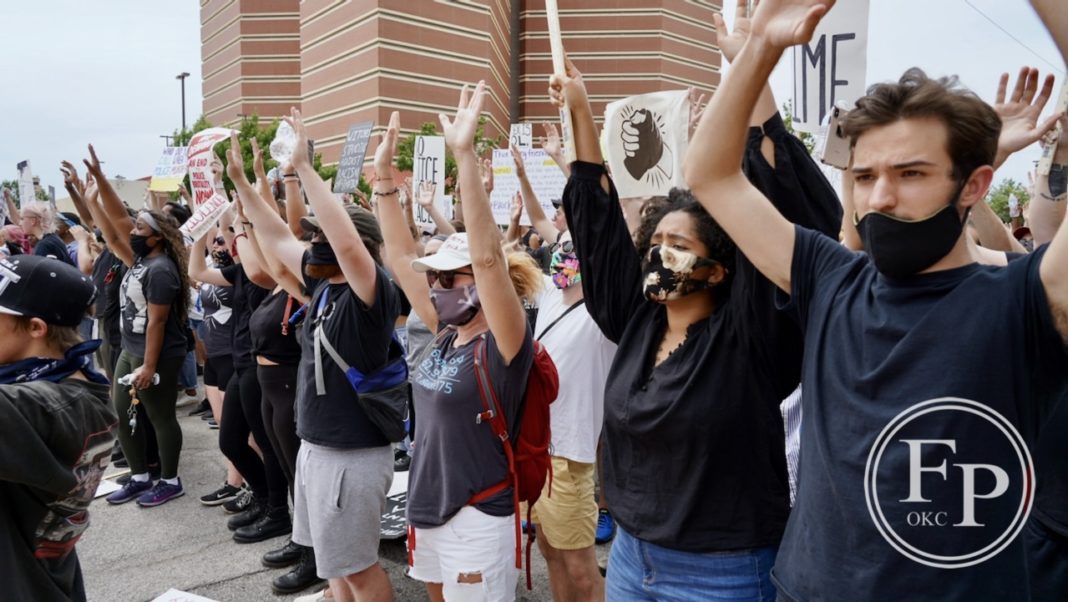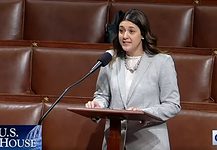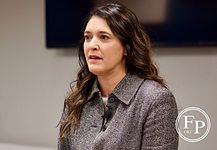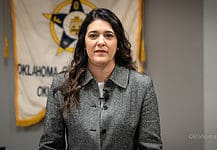Last Updated on July 10, 2020, 2:27 PM | Published: July 10, 2020
Major Travis Yates of the Tulsa Police Department said the quiet part out loud. It is the part that drives many citizens and city councils to “defund” the police.
Last month, as the May 25 murder of George Floyd inspired worldwide protests against police violence and systemic racism, Yates told KFAQ-FM Tulsa radio/podcast host Pat Campbell on June 8 that based on crime statistics, police would be justified in killing more African Americans than they are already killing.
Opinion by George D. Lang
“And, by the way, all the research says — including Roland Fryer, an African American Harvard professor, Heather MacDonald, and the National Academy of Sciences, all of their research says we’re shooting African Americans about 24 percent less than we probably ought to be based on the crimes being committed,” said Yates on Campbell’s podcast.
Because context matters, Yates also said that the subjugation of blacks in America by police is a myth.
“This is what they’re trying to say that all these changes need to come from: this is why we’re protesting, this is why we’re rioting,” Yates said. “Because of systematic abuse of power and racism. That just doesn’t exist.”
In recent statements, including a 2018 letter to Tulsa mayor G.T. Bynum, Yates referred to allegations of systemic racism in police departments as “a great scam.” Just so everyone understands that Yates’ comments last month were not isolated or momentary lapses from a normally tolerant law enforcement officer, Yates wrote a 2016 essay for the Law Officer website titled “Follow Commands or Die.”
Yates asked, “Would we even know where Ferguson was if Michael Brown would have simply got out of the street like the officer had asked him to do?”
Following years of such comments on race and policing and recent condemnation of his comments by Bynum, Yates is still employed. This proves the fallacy of Yates’ never-ending thesis; systemic racism in police departments and the circling of wagons by police unions is the reason why law enforcement officers like Yates are still on forces throughout the country.
Since Yates’ comments last month, several shooting incidents underlined the horrors of overenforcement against black suspects.
On June 25, Robert D’Lon Harris was killed by Oklahoma Highway Patrol. He was a passenger in a car stopped by OHP. According to an Instagram post by civil rights attorney Lee Merritt, who is representing Harris’ family in the case, Harris did nothing to provoke being shot, point-blank, in the head.
“His name was Robert Harris,” Merritt wrote. “He was a passenger during a motor vehicle stop in Tulsa, Oklahoma this past Thursday. When Oklahoma Highway Patrol asked him to step back out of the car he protested that he was just a passenger, prompting the officer to draw his firearm. For reasons not apparent to the driver and never explained to the family of Mr. Harris, he was then shot at point-blank range in the head. The driver never saw a gun. There was no aggression on the part of Mr. Harris — just a single shot to the head, killing him.”
Over the July 4 weekend, an off-duty Langston University police officer confronted a suspected shoplifter at a Del City Walmart and shot into the suspect’s car over 10 times, according to smartphone footage shot on the scene.
The shoplifting suspect, Kenneth Lee Simmons, was hit by gunfire. The off-duty police officer, it should be noted, was wearing his uniform, including a black kevlar vest with “POLICE” printed in bright white letters on the back. While Simmons has been identified, the officer who shot him has not.
Del City Police told KOCO they would turn over their information to the Oklahoma County District Attorney’s Office. But the current DA, David Prater, is working through his own issues with overenforcement and excessive prosecution. On June 26, Prater charged three Black Lives Matter protesters with terrorism. In a statement, Prater said, “When you act like a terrorist, you will be treated like a terrorist.”
Oh yes, and as President Donald Trump tweeted, referencing Miami, Florida police chief Walter Headley’s threat from 1967, “When the looting starts, the shooting starts.” As Yates wrote, “Follow commands or die.”
Prater’s comment shows why the black community cannot trust either side of the “Law & Order” equation. Del City Police Department said it would refer information regarding the Walmart shooting to Prater’s office, but Prater is already institutionally inclined to use what the American Civil Liberties Union of Oklahoma described as politically biased and excessive prosecution.
Excessive prosecution is one reason why Oklahoma prisons are overcrowded, because prosecutors like Prater flex their “tough on crime” muscles and serve as a unified front with police departments.
As Kris Steele, former Republican house speaker and current executive director of The Education and Employment Ministry (TEEM) told me earlier this year, “I do believe prosecutors have found their political worth based on the number of convictions and based on the mindset of being tough on crime. I do think it is incumbent on the people of Oklahoma to challenge that culture.”
Prater and our state’s law enforcement officers are doubling down in the face of the Black Lives Matter protests — either that, or we are just hearing about more shootings now.
When police and prosecutors overstep their authority, all citizens have a responsibility to speak up. The black community needs white allies who will challenge police departments, their unions and prosecutors to reform, re-educate themselves and respond to our calls for equal protection under the law.
If that is not forthcoming, the public outrage recedes and people like Yates and Prater continue to antagonize and persecute people to achieve their goals, we will only see more deaths at the hands of an emboldened force. We, as citizens, should not face a choice between following commands and dying.
George Lang has worked as an award-winning professional journalist in Oklahoma City for over 25 years and is the professional opinion columnist for Free Press. His work has been published in a number of local publications covering a wide range of subjects including politics, media, entertainment and others. George lives in Oklahoma City with his wife and son.











